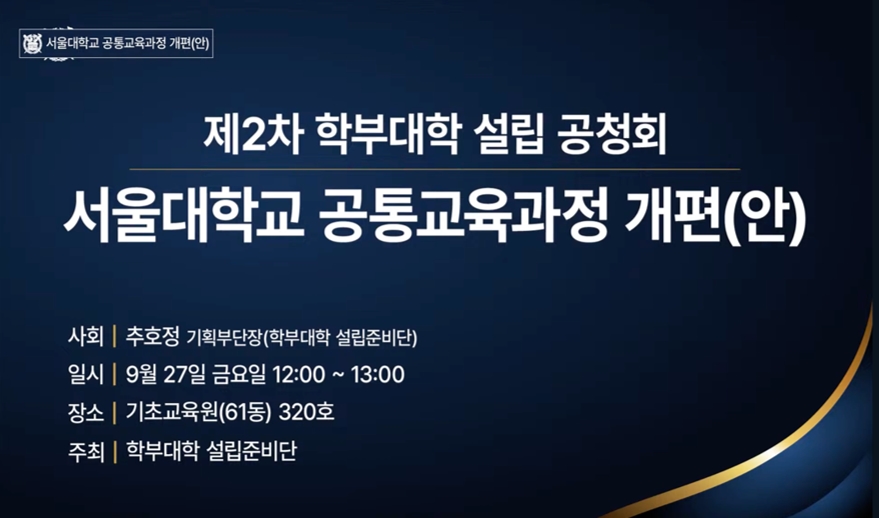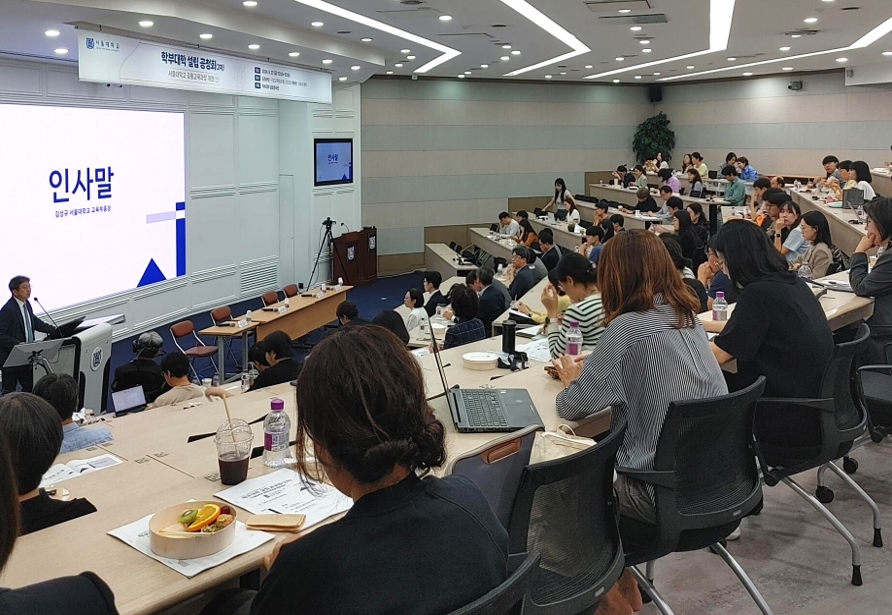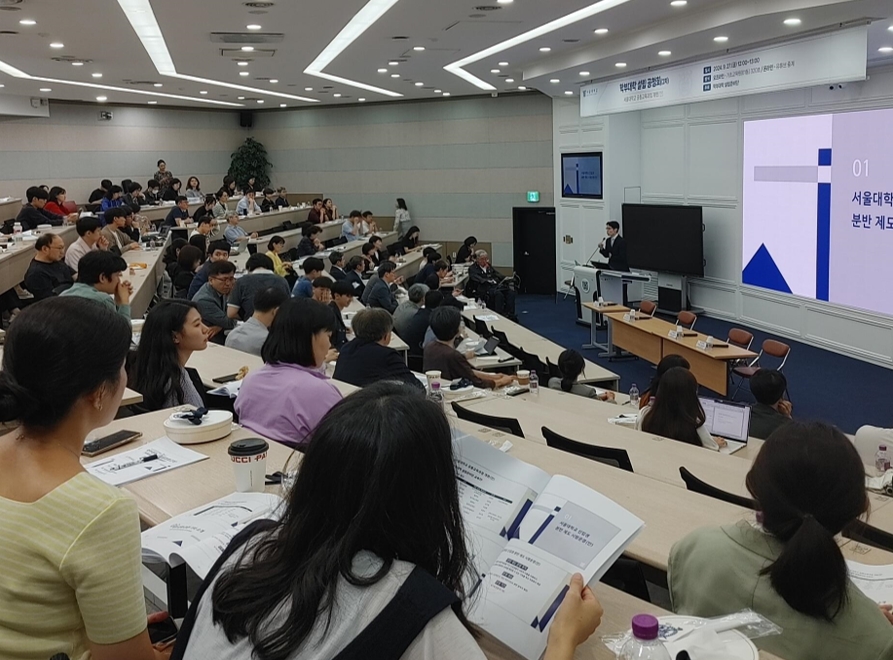
The Official Logo of SNU College
Seoul National University plans to launch the SNU College in the spring semester of 2025 to foster future leaders with the essential core competencies required to navigate a rapidly changing era. With an initial enrollment of 159 students, the new college will consist of two academic units: SNU College and SNU College – College of Liberal Studies. The creation of SNU College will integrate the existing Faculty of Liberal Education, the College of Liberal Studies, and the Academic Advising Center. It will take on responsibilities such as implementing a common core competency curriculum for all undergraduate students, supporting major and career exploration, and overseeing students without a declared major.
Since the launch of the SNU College Establishment Team in January, five relay-style forums and three open discussions have been held to share the opinions on its establishment. With its launch in the upcoming spring semester, SNU College aims to nurture interdisciplinary talents and serve as a model for innovative higher education programs.
The following is a report on the second open discussion held last September.

The Second Open Discussion on the SNU College
On September 27, the SNU College Establishment Team hosted the second open discussion on the SNU College. The first open discussion, held on June 11, revealed the structural outlines and objectives of the college for the first time. It also acted as a platform for members of the SNU community, from faculty members to current students, to share their opinions on the proposed plan. Since then, much work has been done in adopting the suggestions and detailing the organizational and educational aspects of the SNU College. The fruits of these efforts were uncovered in this second open discussion. Overall, the aim was to gather final suggestions and provide clarifications in order to establish a college that is responsive to the needs of the SNU community in the face of a rapidly changing world.
The open discussion started with a ceremonial speech by Executive Vice President for Academic Affairs, Kim Seong-Kyu. Having participated in the initial stages of formulating the SNU College, he reminisced about his experience debating different proposals shared by various members of the SNU community. Although everyone had differing ideas on the details of the college, there was a general consensus that changes to the current system were required, especially to better prepare SNU students for their lives after graduation. The new college is thus a necessary change for the advancement of SNU, and Executive Vice President Kim urged the participants of the open discussion to actively lay out their own proposals and amendments at this session.

Executive Vice President for Academic Affairs Kim Seong-Kyu Giving a Ceremonial Speech
Introducing the SNU College
The plan to establish the SNU College was founded under the general agreement that there was a need for the system of liberal education at SNU to change. Currently, the “liberal education programs” formally called “general education courses”, are run by the SNU Faculty of Liberal Education. However, despite the important role played by the faculty, there are limits to its ability to support the SNU community because it is administratively categorized as a supporting facility. One of the bigger issues is the absence of full-time faculty members, meaning that those who teach general education courses are susceptible to change. Any long-term plans for lectures or future programs therefore cannot be easily drafted. With such considerations in mind, the process of creating a new college was started in October 2023 and is expected to be finalized and launched in the spring semester of 2025.
Professor Noh Yoo-sun, the head of the SNU College establishment team, explained the core aims of the college at the beginning of the open discussion: enhance the capabilities of SNU to provide more skill-based education to its students, and nurture the abilities of SNU members to become active members of the global community. The structural changes and new courses of the college hence aim to be more interdisciplinary. Specifically, Professor Noh explained that the courses and programs provided will be categorized into Common Core Education, Convergence Education, and Global Education, with students being required to take classes from all three areas.
A key aspect to note is that the SNU College is not just an expansion of the Faculty of Liberal Studies. Rather, it is the creation of an entirely new educational organization that will include the roles that have thus far been undertaken by the Faculty of Liberal Studies. Apart from the development and operation of general education courses, the current College of Liberal Studies and the Academic Advising Center will also be integrated into this new college.

Explaining the Restructure of the SNU College
Changing the Liberal Education System at SNU
The main event of the open discussion was the detailed briefing that explained how the courses of the Faculty of Liberal Studies were subject to change under the new college. Presented by Professor Ko Heejeong (Department of Linguistics), the head of the education department of the establishment team, the discussion outlined the overall structure of the draft liberal studies system and its specific contents. The new system is to be divided into four categories: Veritas, Key to Wisdom, Advancement of Intellect, and Foundations of Academia. Apart from the “Veritas” category, the rest are based on the current divisions of the general education courses. The sub-categories within these bigger divisions have been re-structured to be based on skill rather than academic disciplines with courses categorized accordingly.
The “Veritas” category is a new development of the SNU College. The courses that fall under this category focus on transdisciplinary themes, driving students to engage more deeply with transdisciplinary values and issues. The courses under “Veritas” will be divided into “Veritas 1,” “Veritas 2,” and “Veritas Practice” depending on the topics they cover. Currently, several “Veritas 1” and “Veritas Practice” courses are being trial-run so the establishment team can receive feedback and further develop the courses for the next semester.
Developing the Foundations for SNU College Together
After the presentations explaining the details of the SNU College, the moderator opened the floor to the audience for questions and feedback. One proposal by Professor Lee Sang-Mook (School of Earth and Environmental Sciences) was to introduce courses that gave students opportunities to visit off-site locations abroad to properly observe and investigate the environment. Lee elaborated on how such experiences would expand students’ research capabilities and possibly enable them to better invest in their research. The establishment team received this proposal positively and promised to consider the suggestion in the development process.
The second open discussion on the SNU College was an opportunity for the SNU community to participate in building the foundations for a new educational organization. With only a semester left until the SNU College is established, we can look forward to the changes that it will bring to the university.
Written by Yeryoung Lee, SNU English Editor, yeryounglee@snu.ac.kr

